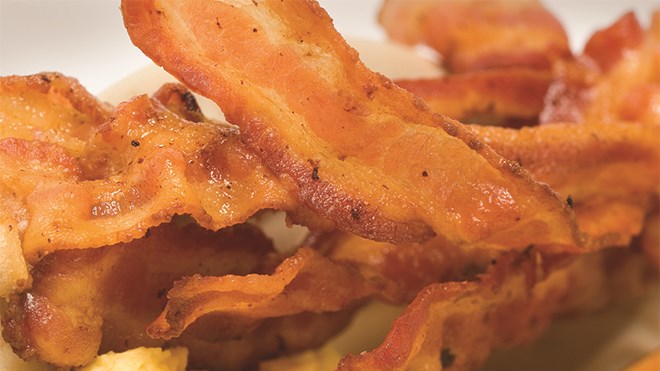It's true. After the news broke last week that processed meats, like bacon, cause colorectal cancer, I thought it would be clever to costume myself in the crispy, greasy wonderfulness that is bacon, surely the greatest of all the processed meats.
With bacon's new position as the most evil and vile of all protein delivery systems, cashing in on the horror for my Halloween costume seemed a perfect fit.
I eventually decided against parading about in a raiment of fried pig flesh (my son and I instead sported black felt goatees as "Evil Mark" and "Evil Eli" in a reference to "Community," one of our favourite TV shows). People already seemed confused enough by the new classification of processed meat as a silent killer and I didn't want add to that perturbation.
People's confusion is understandable given the terrible job the media did sharing the news. "Processed meats rank alongside smoking as cancer causes — WHO" The Guardian wrote on Oct. 26. "Bacon poses same cancer risk as cigarettes, world health group claims" cried the Atlanta Journal Constitution. And "OMG! Bacon causes cancer" from the New York Post.
The reporting got better and more accurate as the days passed, but that initial blast of sensationalism is going to stick around in the public consciousness.
You can't blame the media or the public for being confused by the reporting. For all the necessary and good work it does, the International Agency for Research on Cancer (IARC) is really bad at writing press releases.
From the press release: Processed meat was classified as carcinogenic to humans (Group 1), based on sufficient evidence in humans that the consumption of processed meat causes colorectal cancer.
If one were curious enough to look up what else the World Health Organization classifies as Group 1 carcinogens, one finds processed meats listed right alongside tobacco and asbestos. Reporters did look it up, and lo and behold we end up with headlines in which bacon and smoking appear together, as though both are equally as potentially deadly — they aren't.
You see, the IARC's job is to classify things in terms of whether or not they cause cancer in people. That's it. It's not the IARC's job to say what the chances are a particular substance will give you cancer.
In other words, the IARC doesn't deal in risk.
And yet, the press release it put out went on to tell us about that risk. "The experts concluded that each 50 gram portion of processed meat eaten daily increases the risk of colorectal cancer by 18 per cent."
But 18 per cent of what? The IARC doesn't say. You'll find, if you do a little poking around, that if you eat 50 grams of processed meat (about two slices of bacon) every day of your life, it increases your colorectal cancer risk by 18 per cent of everyone’s base colorectal cancer risk, which is five per cent.
Every one of us has about a five per cent chance of developing colorectal cancer at some point in our lives. Eighteen per cent of five per cent is less than one percentage point.
So eating bacon doesn't increase your risk by 18 per cent; it increases it to about 5.9 per cent, which is still significant and should make you reconsider eating bacon, lunch meat or hot dogs every day.
But if the IARC had simply stated that in the initial press release — provided that little, but important, bit of context — bacon lovers the world over could have been spared a lot of heartache.
This isn't the first time the IARC's important work has been overshadowed by its poor press release skills, and the mass media's desire not to let a compelling headline get in the way of the facts.
In 2011, the association changed its classification of cellphones to Category 2B, or possibly carcinogenous to humans (which can also be read as "maybe, but we're really not sure"), and the world freaked out.
People didn't stop using phones, but many of us did start using an earpiece so we didn't have to hold the phone to our heads and countless others purchased useless snake oil like cellphone shields that claim to block electromagnetic radiation (news flash: they don't)
What else does the IARC classify as possibly carcinogenous? Coffee, pickles and nickles (yes, the coins).
The IARC really needs to work on its communications skills and the media really needs to work on its science skills, because between the two of them, some of my favourite things (bacon and my phone) are being dragged through the mud. Perhaps both sides should take a few of Laurentian University professor David Pearson's science communication classes and learn how to talk to people.
But we, as members of the public, also need to work on some things. Like reading an entire story, not just the headline, before sharing. Like not getting our news from just one source. Like taking a look at the news source to see how credible it is (the Globe and Mail and Natural News are not created equal).
All this talk about bacon has given me a hankering and there's a rasher in the fridge calling my name. Happy frying (but not every day).
Mark Gentili is the managing editor of NorthernLife.ca.
Join Sudbury.com+
- Messages
- Post a Listing
- Your Listings
- Your Profile
- Your Subscriptions
- Your Likes
- Your Business
- Support Local News
- Payment History
Sudbury.com+ members
Already a +member?
Not a +member?
Sign up for a Sudbury.com+ account for instant access to upcoming contests, local offers, auctions and so much more.
